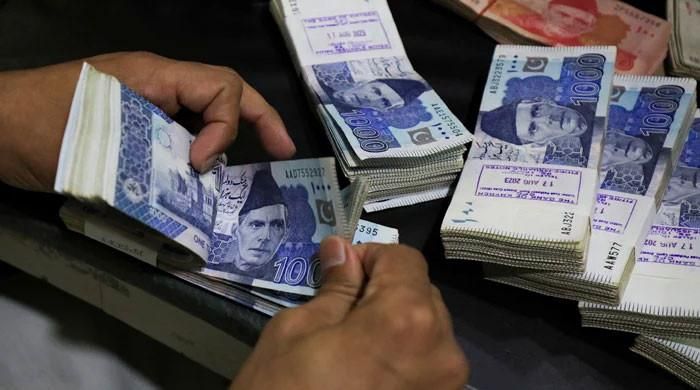He is widely expected to seek an IMF bailout after the new government takes over.
- The rupee gained slightly against the dollar in the interbank market.
- A foreign exchange advisory company describes the political situation as “fluid.”
- Uncertainty could affect the confidence of investors and creditors.
KARACHI: The rupee is expected to trade in a narrow range in the coming weeks as healthy dollar supplies from exporters will offset political uncertainty after a split election result, analysts and traders said on Saturday.
The rupee gained slightly against the dollar in the interbank market this week, closing at 279.28 on Friday, up from 279.42 on Tuesday. The market was closed on Monday for Kashmir Day and on Thursday for the general elections.
The elections, which were marred by accusations of manipulation and violence, produced a parliament without consensus, with no clear winner among the three main parties. Jailed former Prime Minister Imran Khan's party, which fielded many independent candidates, emerged as the largest bloc, followed by Nawaz Sharif's Pakistan Muslim League-Nawaz (PML-N) and Pakistan People's Party (PPP) of Bilawal Bhutto Zardari. .
Both Khan and Sharif claimed victory and promised to form the next government, raising fears of a prolonged political deadlock that could delay much-needed reforms and external financing for the cash-strapped country.
“The political situation is very fluid and uncertain. There is a risk of protests and violence if the final results are not accepted by all parties,” Tresmark, a foreign exchange advisory firm, said in a note to clients.
“This could affect the confidence of investors and creditors and put pressure on the rupee and the external account.”
Pakistan faces a widening current account deficit, dwindling foreign exchange reserves and a looming debt crisis. He is widely expected to seek a bailout from the International Monetary Fund (IMF) once the new government takes power.
The IMF has already completed two reviews of Pakistan's $3 billion lending program, but the third, scheduled for March, could face hurdles due to political deadlock and a possible shift in economic policies.
“Despite the political noise, we expect the rupee to remain stable in the near term as there is ample dollar liquidity in the market from exporters who are selling more in forward contracts,” Tresmark said.
“Forward premiums are attractive and we see more selling in the 15-60 day terms. The market also anticipates more inflows from bilateral and multilateral sources once the political dust settles.”
Tresmark said the rupee was likely to trade in the range of 278-282 this month, with limited upside potential.
“Any appreciation beyond the 276 level will harm the competitiveness of exports, which are crucial for the economy. The new government will have to focus on curbing inflation and increasing foreign exchange reserves, as well as addressing the structural problems of low growth, income and productivity,” he said.
Pakistan's foreign exchange reserves held by the central bank fell by $173 million to $8.044 billion as of February 2, according to the latest data.
Originally published in The News












